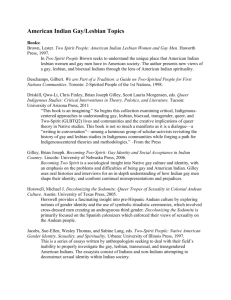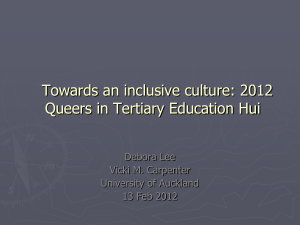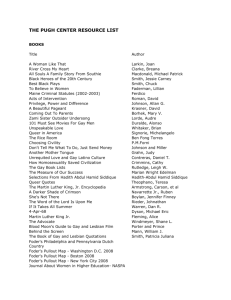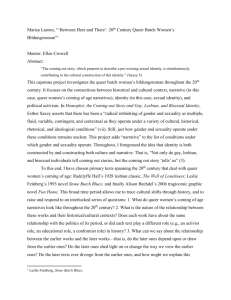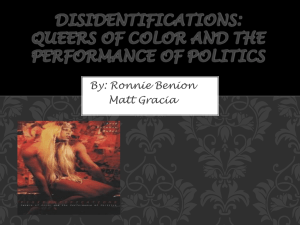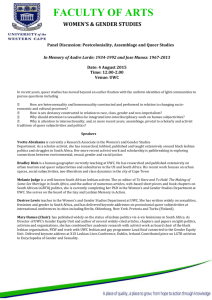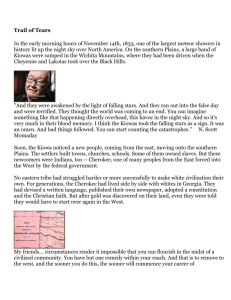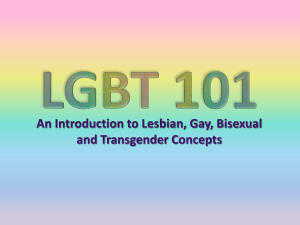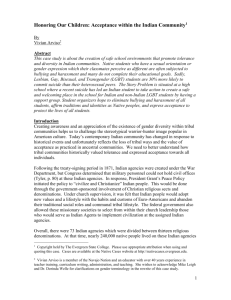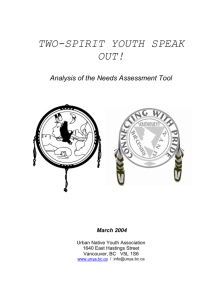Indigenous Literature with a Queer/LGBT/Two
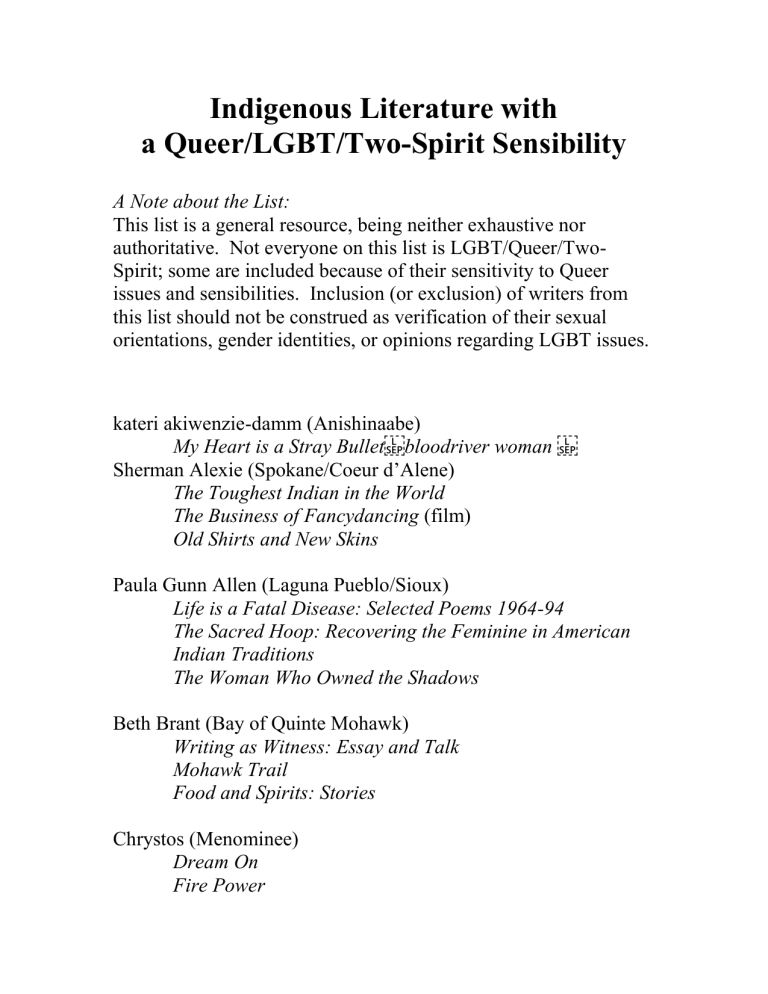
Indigenous Literature with a Queer/LGBT/Two-Spirit Sensibility
A Note about the List:
This list is a general resource, being neither exhaustive nor authoritative. Not everyone on this list is LGBT/Queer/Two-
Spirit; some are included because of their sensitivity to Queer issues and sensibilities. Inclusion (or exclusion) of writers from this list should not be construed as verification of their sexual orientations, gender identities, or opinions regarding LGBT issues. kateri akiwenzie-damm (Anishinaabe)
My Heart is a Stray Bullet
bloodriver woman
Sherman Alexie (Spokane/Coeur d’Alene)
The Toughest Indian in the World
The Business of Fancydancing (film)
Old Shirts and New Skins
Paula Gunn Allen (Laguna Pueblo/Sioux)
Life is a Fatal Disease: Selected Poems 1964-94
The Sacred Hoop: Recovering the Feminine in American
Indian Traditions
The Woman Who Owned the Shadows
Beth Brant (Bay of Quinte Mohawk)
Writing as Witness: Essay and Talk
Mohawk Trail
Food and Spirits: Stories
Chrystos (Menominee)
Dream On
Fire Power
In Her I Am
Not Vanishing
Qwo-Li Driskill (Cherokee/Osage/Lenape/Lumbee)
Book of Memory: Honor Poems
Burning Upward Flight
Walking with Ghosts: Poems
Louise Erdrich (Turtle Mountain Chippewa)
Love Medicine
The Antelope Wife
The Last Report on the Miracles at Little No Horse
Janice Gould (Koyangk′auwi Maidu)
Earthquake Weather
Beneath My Heart
Joy Harjo (Mvskoke)
In Mad Love and War
A Map to the Next World
She Had Some Horses
Tomson Highway (Cree)
Dry Lips Oughta Move to Kapuskasing
Kiss of the Fur Queen
The Rez Sisters
Daniel Heath Justice (Cherokee)
Kynship: The Way of Thorn and Thunder, Book One
Wyrwood: The Way of Thorn and Thunder, Book Two
Maurice Kenny (Mohawk)
Backward to Forward: Prose Pieces
Tekonwatonti/Molly Brant: Poems of War
Janet McAdams (Creek)
The Island of Lost Luggage
Deborah Miranda (Esselen/Chumash)
Indian Cartography
The Zen of La Llorona
(Rollie) Lynn Riggs (Cherokee)
The Cherokee Night
The Cream in the Well
The Iron Dish
Gregory Sarris (Miwok/Pomo)
Grand Avenue
Keeping Slug Woman Alive: A Holistic Approach to
American Indian Texts
Watermelon Nights
Gregory Scofield (Métis)
I Knew Two Metis Women
Love Medicine and One Song
Thunder Through My Veins: Memories of a Métis
Childhood
James Thomas Stevens (Akwesasne Mohawk)
Combing the Snakes from His Hair
A Bridge Dead in the Water
Craig S. Womack (Muskogee Creek/Cherokee)
Drowning in Fire
Red on Red: Native American Literary Separatism
Other writers
Joanne Arnott (Anishinaabe/Lakota)
Cathie Dunsford (Maori)
Connie Fife (Cree)
Jewell Gomez (Wampanoag/Ioway)
Carole laFavor (Anishinaabe)
Vickie Sears (Cherokee)
Alice Walker (Cherokee)
Selected Secondary Sources
A Note About Terminology:
Indigenous people identify same-sex eroticism and non-dualistic concepts of gender by many names, and we have attempted to respect that diversity here. Different communities have different terms and understandings—such as winkte and koskalaka (as per
Allen) among Lakotas and nádleeh
among Navajos—that do not always translate into Eurowestern concepts of sexuality and gender. As most of these concepts are tribally-specific and thus not universal, we have generally kept with the inclusive acronym
LGBTQ, the broader “Queer,” or the contemporary pan-Native
“Two-Spirit.” The latter is a contested term, as it collapses cultural differences into a binary concept that is not equally applicable or relevant to all Indigenous communities. Nevertheless, many contemporary Native people embrace the concept of Two-Spirit, so we acknowledge it here along with LGBTQ and Queer. The term
“berdache,” however, is a different matter. It is used by some of the secondary sources (particularly Will Roscoe), but it is strongly disliked by most LGBTQ/Queer/Two-Spirit people, and is generally perceived as an insult.
Allen, Paula Gunn. "Beloved Women: Lesbians in American
Indian Cultures." Conditions: Seven 3.1 (Spring 1981): 67-
87.
Brant, Beth. “From the Inside – Looking at You.” Canadian
Woman Studies – Les Casiers de la Femme, 14.1 (Fall
1993): 16-17.
- - -. “Giveaway: Native Lesbian Writers.” Signs: Journal of
Women in Culture and Society , 18.4 (Summer 1993): 944-
47.
Brown, Lester B. Two Spirit People: American Indian Lesbian
Women and Gay Men . Binghamton, NY: Harrington Park
P, 1997.
Cameron, Barbara. "No Apologies: A Lakota Lesbian
Perspective." The New Our Right to Love: A Lesbian
Resource Book . Ed, Ginny Vida. New York: Touchstone,
1996. 234-36.
Carocci, Massimiliano. “The Berdache as Metahistorical
Reference for the Urban Gay American Indian
Community.”
Present is Past: Some Uses of Tradition in
Native Societies . Ed. Marie Mauze. Landam, MA: UP of
America, 1997.
Cochran, Jo Whitehorse. “From a Long Line of Contrary Folks.”
The New Lesbian Studies: Into the Twenty-First Century .
Ed. Bonnie Zimmerman and Toni A.H. McNaron. New
York: Feminist P, 1996.
Cornell, Daniel. “Woman Looking: Revis(ion)ing Pauline’s
Subject Position in Louise Erdrich’s
Tracks
.”
Studies in
American Indian Literatures 4.1 (Spring 1992): 49-64.
Deschamps, Gilbert. We Are Part of a Tradition: A Guide on
Two-Spirited People for First Nations Communities.
Mino-B’maadiziwin Project. Toronto: 2-Spirited People of the First Nations, 1998.
www.2spirits.com
Dickinson, Peter. Here is Queer: Nationalisms, Sexualities, and the
Literatures of Canada. Toronto: U of Toronto P, 1999.
Douglas, Carol Anne. “Judith Witherow: A Storyteller.” Off Our
Backs: A women’s Newsjournal,
29.2 (February 1999): 14-
17.
Driskill, Qwo-Li. “My Dragonfly Tongue.” Mavin 6 (2002): 60-
61.
Eberly, David. “Poetry: Two Spirit.” International Journal of
Sexuality and Gender Studies 6.3 (2001): 221.
Elledge, Jim, ed. Gay, Lesbian, Bisexual and Transgender Myths from the Arapaho to the Zuni: An Anthology . American
Indian Studies Ser. 13. New York: Peter Lang, 2002.
Gay American Indians and Will Roscoe, eds. Living the Spirit: A
Gay American Indian Anthology . New York: St. Martin’s,
1998.
Gould, Janice. “Disobedience (in Language) in Text by Lesbian
Native Americans.”
ARIEL: A Review of International
English Literature 25.1 (January 1994): 32-44.
Grahn, Judy.
"Strange Country This: Lesbianism and North
American Indian Tribes." Journal of Homosexuality . 12.3-4
(1986): 43-45.
Holford, Vanessa. "Re-Membering Ephanie: A Woman's
Recreation of Self in Paula Gunn Allen's The Woman Who
Owned the Shadows ." SAIL 6.1 (1994): 99-113.
Jacobs, Sue-Ellen, Wesley Thomas and Sabine Lang. Two Spirit
People: Native American Gender Identity, Sexuality, and
Spirituality . Urbana: U of Illinois P, 1997.
A particularly culturally-sensitive and intellectually-rigorous scholarly analysis of Two-
Spiritedness in contemporary Native North
America. Much stronger and more respectful to tribal specificity than the works of Brown,
Roscoe, or Williams. Includes numerous Native contributors.
Justice, Daniel Heath. Our Fire Survives the Storm . U Minnesota
P, 2006.
Lang, Sabine. “Lesbian, Men-Women and Two-Spirits:
Homosexuality and Gender in Native American Cultures.”
Female Desires: Same Sex Relations and Transgender
Practices across Cultures . Ed. Evelyn Blackwood and
Saskia E. Wieringa. New York: Columbia UP, 1999.
Little Thunder, Beverly. "Native American Spirituality." The New
Our Right to Love: A Lesbian Resource Book . Ed, Ginny
Vida. New York: Touchstone, 1996. 185-87.
Medicine, Beatrice . Learning to be an Anthropologist and
Remaining “Native”: Selected Writings
. Urbana: U of
Illinois P, 2001.
In particular, see “Changing Native American
Roles in an Urban Context and Changing Native
American Sex Roles in an Urban Context” and
“Warrior Women”: Sex Role Alternatives for
Plains Indian Women.”
Miranda, Deborah. "Dildos, Hummingbirds, and Driving Her
Crazy: Searching for Native American Women's Erotics."
Frontiers 23.2 (2002).
Moon, Michael. “Whose History? The Case of Oklahoma.” A
Queer World: The Center for Lesbian and Gay Studies
Reader.
Ed. Martin Duberman. New York, New York UP,
1997.
Prince-Hughes, Tara. The Two-Spirit Heritage: Gender and Social
Responsibility in Fiction by Native American and
Alternative Gender Writers . Dissertation Abstracts
International, Ann Arbor, MI. September 1998.
- - -. “Contemporary Two-Spirit Identity in the Fiction of Paula
Gunn Allen and Beth Brant.”
SAIL 10.4 (Winter 1998): 9-
31.
Osborne, Karen Lee. “Swimming Upstream: Recovering the
Lesbian in Native American Literature.”
Lesbian and Gay
Studies and the Teaching of English: Positions, Pedagogies and Cultural Politics . Ed. William J. Spurlin. Urbana:
National Council of Teachers of English, 2000.
Roscoe, Will. Changing Ones: Third and Fourth Genders in
Native North America . New York: St. Martin's, 1998.
- - -. “Was We’wha a Homosexual? Native American Survivance and the Two-Spirit Tradition.” A Journal of Lesbian and
Gay Studies 2.3 (1995): 193-235.
Tafoya, Terry. "Native Gay and Lesbian Issues: The Two-
Spirited." Ethnic and Cultural Diversity Among Lesbians and Gay Men . Ed. Beverly Greene. Vol. 3. SAGE
Publications, Inc: Thousand Oaks, 1997. 1-9.
Tafoya, Terry and Douglas A. Wirth. “Native American Two-
Spirit Men.”
Men of Color: A Context for Service to
Homosexually Active Men . Ed. John F. Longres.
Binghamton, NY: Harrington Park P, 1996: 51-67.
Thomas, Wesley and Sue-Ellen Jacobs. “’…And We Are Still
Here’: From Berdache to Two-Spirit People.”
American
Indian Culture and Research Journal 23.2 (1999): 91.
VanDyke, Annette. “The Journey Back to Female Roots: A
Laguna Pueblo Model.”
Lesbian Texts and Contexts:
Racial Revisions . Ed. Karla Jay, Joanne Glasgow, and
Catherine Stimpson. New York: New York UP, 1990.
Williams, Walter L. The Spirit and the Flesh: Sexual Diversity in
American Indian Culture.
Boston: Beacon, 1992.
Wilson, Alex. "How We Find Ourselves: Identity Development and Two-spirit People." Harvard Educational Review . 66.2
(1996): 303-317.
Womack, Craig S. “Howling at the Moon: The Queer but True
Story of My Life as a Hank Williams Song.” As We Are Now:
Mixblood Essays on Race and Identity . Ed. W. S. Penn. Berkeley:
U of California P, 1998.
- - -. “Lynn Riggs as Code Talker: Toward a Queer Oklahomo
Theory and the Radicalization of Native American
Studies.”
Red on Red: Native American Literary
Separatism . Minneapolis: U of Minnesota P, 1999: 271-
303.
- - -. “Politicizing HIV Prevention in Indian Country.” Native
American Religious Identity: Unforgotten Gods. Ed. Jace
Weaver: New York: Orbis P, 1998.
